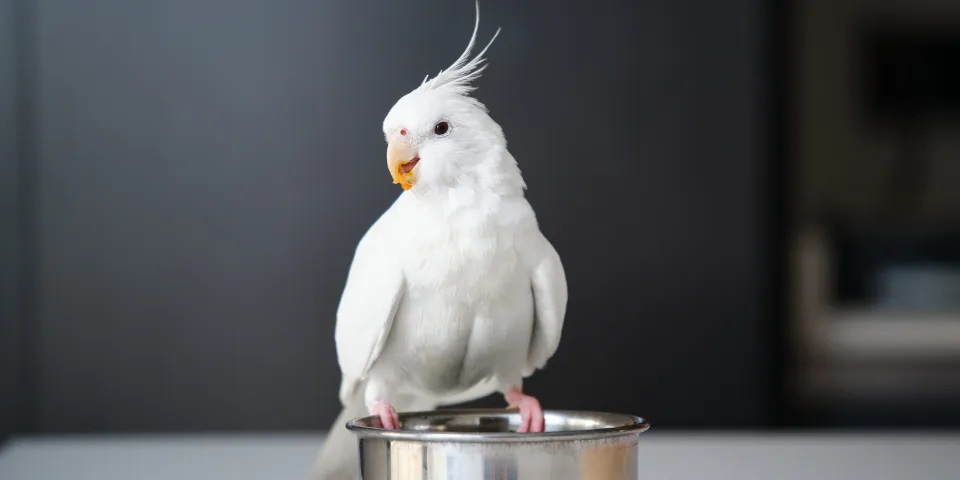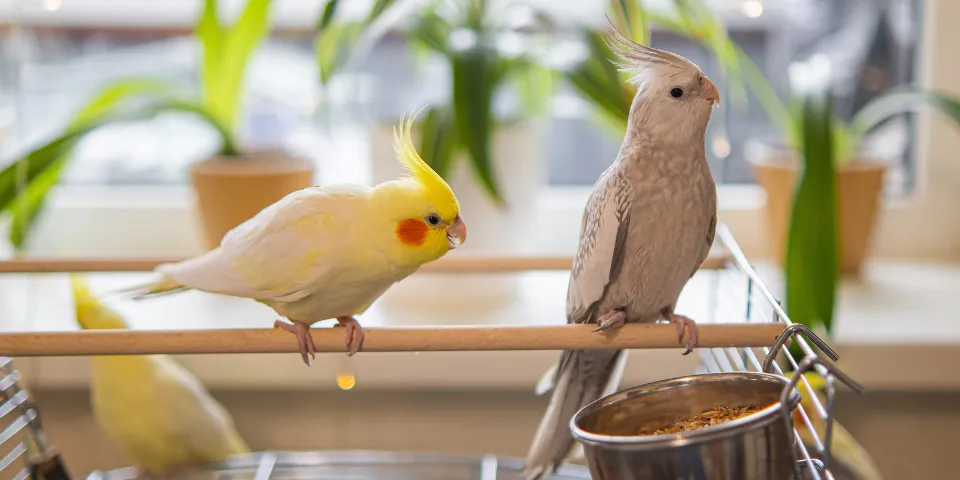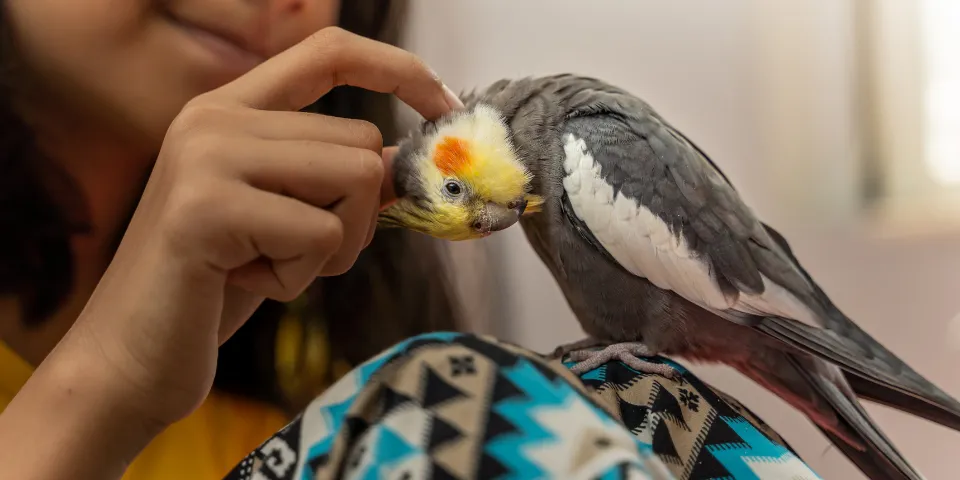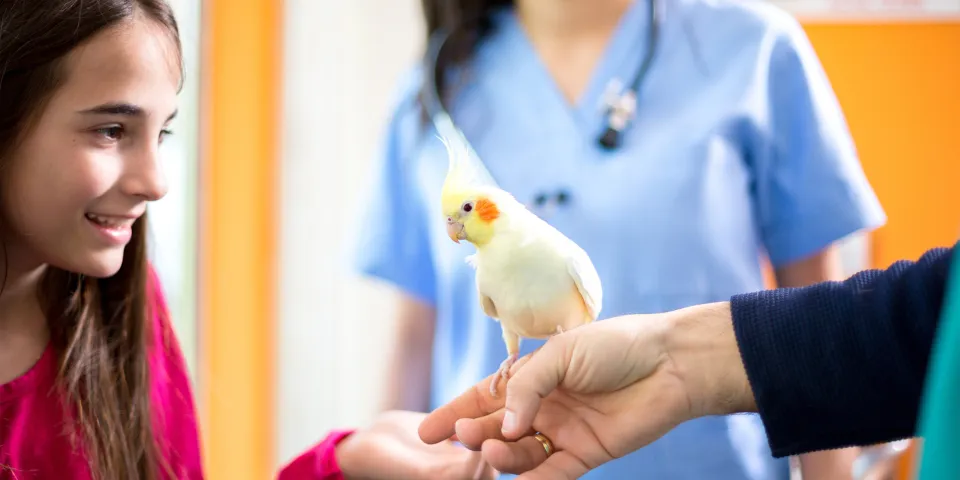Cockatiel care is essential for keeping these vibrant, affectionate birds healthy and happy. As charming companions full of personality, cockatiels thrive with proper nutrition, spacious housing, engaging play, and regular veterinary attention. Drawing from veterinary expertise like that of Dr. Veronica Pardini, DVM, CertAqVET, this guide covers everything from diet essentials to bonding tips, helping new and experienced owners provide the best cockatiel food diet. Whether you’re setting up their first home or refining routines, these insights ensure your feathered friend flourishes.
 Albino cockatiel eating from metal dish
Albino cockatiel eating from metal dish
Cockatiel Nutrition 101: Building a Balanced Diet
A nutritious diet forms the foundation of cockatiel care. Many owners start with seed mixes, but experts recommend prioritizing pellets for complete nutrition. Seeds are tasty but lack balance, while high-quality pellets deliver vital vitamins, minerals, and proteins tailored for parrots like cockatiels.
Current research supports feeding pellets as the daily staple, supplemented by about two teaspoons of premium seed mix without sunflower seeds to avoid excess fat. Options like ZuPreem’s Sensible Seed for large birds exemplify this approach, promoting long-term health. For deeper dives into optimal feeding, explore our detailed cockatiel diet and nutrition resources.
Fresh fruits and vegetables add variety and essential nutrients. Cockatiels often favor herbs like parsley, dill, and cilantro over leafy greens. Nutrient-packed veggies such as sprouts, broccoli, squash, green beans, and peppers provide fiber and antioxidants. Sweet treats including blackberries, blueberries, raspberries, strawberries, figs, kiwi, persimmons, mango, and lychee deliver vitamins A and C without over-sugaring.
Supplements are rarely needed with a varied diet, but cuttlebones offer calcium, especially for breeding females. Always consult an avian vet before adding extras to prevent imbalances.
Hydration is non-negotiable—provide fresh, clean water daily via bowls, bottles, or dispensers. Monitor intake, as changes can signal health issues early.
Cockatiel Housing: Creating a Safe and Stimulating Environment
Proper housing supports cockatiel care by allowing natural behaviors like flying and perching. Despite their compact size, these active birds need ample space: aim for a minimum 20-24 inch square cage, but larger is ideal for flight between perches.
 Two cockatiels on perch in cage
Two cockatiels on perch in cage
Vary perch sizes—natural branches, rope, and platforms mimic wild habitats, preventing foot problems like bumblefoot (pododermatitis). Space perches to encourage movement, reducing obesity risks.
Toys are vital for physical and mental health. Safe, stimulating options keep boredom at bay:
Foraging Toys
Hide food in puzzle toys to spark problem-solving, mimicking wild foraging.
Chew Toys
Wooden blocks and natural fibers satisfy chewing instincts, maintaining beak health.
Interactive Toys
Bells, mirrors, and swings provide auditory and visual engagement, with swings doubling as exercise tools.
Rotate toys every two weeks to sustain interest. For specific feeding ideas that tie into play, check food for cockatiel bird.
Bonding and Playtime: Strengthening Your Connection
Cockatiel care extends to emotional well-being through bonding. Spend consistent, positive time together—talk, whistle, or use clicker training with treats to build trust and teach tricks. Patience respects their unique personalities, fostering affection.
Playtime boosts mental stimulation:
- Interactive Play: Dangle toys or roll balls for chasing.
- Obstacle Courses: Arrange safe items for navigation challenges.
- Foraging Fun: Conceal treats to engage instincts.
- Music Sessions: Gentle tunes or safe instruments delight their vocal nature.
- Quality Interaction: Mimic calls or cuddle gently.
Watch body language—fluffed feathers or panting mean rest time. These activities, paired with solid nutrition, create joyful routines.
 Woman petting cockatiel perched on her shoulder
Woman petting cockatiel perched on her shoulder
Veterinary Care: Proactive Health for Longevity
Avian vets specialize in cockatiel care—find one before adoption for emergencies. Annual exams include physical checks, X-rays, and bloodwork to catch issues early.
Recognize illness signs promptly:
- Excessive sleeping or lethargy
- Droppings changes (color, consistency)
- Appetite loss
- Labored breathing
- Regurgitation
Birds hide sickness, so vigilance saves lives. Prevention through diet, housing, and play minimizes risks.
 Young girl with pet cockatiel at veterinarian
Young girl with pet cockatiel at veterinarian
Caring for cockatiels rewards with years of companionship. Prioritize balanced nutrition, enriching housing, daily bonding, and vet checkups for a thriving pet. Consult professionals for personalized advice, and explore more pet care tips on our site. Your cockatiel’s happiness starts with informed, loving care!
References:
- ZuPreem Avian Nutrition Guidelines (zupreem.com)
- Dr. Veronica Pardini, DVM, CertAqVET insights, published May 31, 2024
